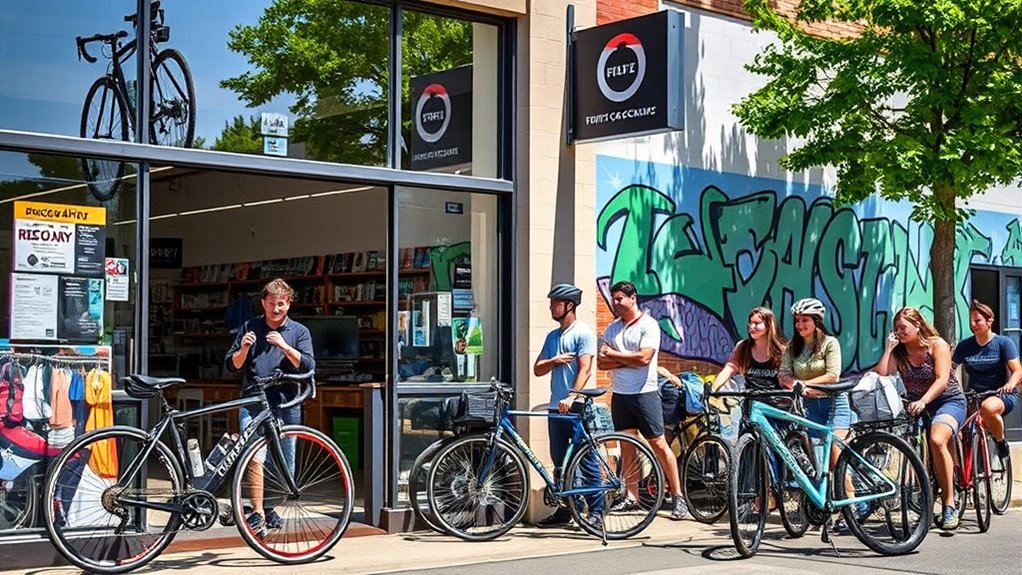Partnering with local bike shops helps you and your community promote cycling, improve safety, and increase access. These collaborations provide tailored route advice, safety tips, and affordable bikes or gear options. Bike shops also host events like group rides and workshops, making cycling more welcoming and fun. Their insights support infrastructure improvements and advocacy for safer bike lanes. Keep exploring how these partnerships can create more active, connected communities that embrace sustainable transportation.
Key Takeaways
- Community partnerships with bike shops promote cycling by providing affordable bikes, repair services, and educational resources.
- Bike shops offer expertise on local routes, safety tips, and maintenance, boosting rider confidence and safety.
- Collaborations enable donation programs and subsidies, increasing access for low-income and underserved riders.
- Partnerships advocate for improved infrastructure like bike lanes and signage, creating safer cycling environments.
- Working with bike shops fosters community events and group rides, encouraging active participation and a culture of cycling.

Community partnerships with bike shops create a powerful way to promote cycling, improve local transportation, and foster a healthier environment. When you team up with local bike shops, you tap into their expertise, resources, and community presence to encourage more people to ride bikes regularly. These collaborations help break down barriers that often stop potential cyclists, like lack of access to affordable bikes, repair services, or safe riding advice. By working together, you can develop programs that make cycling more accessible, enjoyable, and safe for everyone in your neighborhood.
Partnering with bike shops also means you benefit from their deep understanding of local bike infrastructure and terrain. They can offer tailored recommendations for routes, safety tips, and maintenance routines, which can boost confidence among new and experienced riders alike. When bike shops host group rides or clinics, they create a welcoming atmosphere where newcomers feel comfortable trying cycling for the first time. These events not only foster community spirit but also build a sense of belonging among riders, encouraging more consistent participation.
Another advantage of collaborating with bike shops is the opportunity to provide affordable or subsidized bikes and gear. Many shops are willing to offer discounts or donation programs for low-income riders or community members looking to upgrade their gear. Such initiatives help widen access to cycling, making it a feasible transportation option for people from all backgrounds. Additionally, bike shops can serve as distribution points for educational materials on bike safety, maintenance, and local traffic laws, empowering riders to navigate their community confidently and responsibly. Recognizing community engagement as a vital component can further strengthen these partnerships and ensure ongoing support.
A strong partnership with bike shops also opens doors for broader advocacy efforts. You can work together to push for improved bike lanes, better signage, and safer intersections, making cycling safer and more appealing. Bike shops often have valuable insights into common safety concerns and infrastructural gaps, so their input can be pivotal in shaping effective policies. Furthermore, hosting events like bike repair workshops or safety clinics at local shops encourages community engagement and helps normalize cycling as a practical daily activity rather than just a recreational hobby. Establishing collaborative relationships with these shops can amplify advocacy efforts and lead to meaningful infrastructural improvements.
Finally, these partnerships can inspire a cultural shift around transportation. When you collaborate with local bike shops, you promote cycling as a sustainable, healthy, and fun way to get around. As more people see their neighbors and friends riding bikes regularly, it creates a ripple effect that encourages others to give it a try. In essence, working with bike shops transforms the community into a more active, connected, and environmentally conscious place—benefiting individuals and the neighborhood as a whole. Self-awareness and understanding community needs are key to creating successful collaborations that truly serve everyone. Additionally, integrating local infrastructure knowledge can help identify areas for improvement and create safer, more accessible routes for all riders. Furthermore, leveraging their expertise can help develop innovative solutions to common cycling challenges.
Frequently Asked Questions
How Do Bike Shops Select Community Organizations to Partner With?
When choosing community organizations to partner with, you consider several factors. You look for groups aligned with your values, such as promoting cycling safety or encouraging eco-friendly transportation. You also evaluate their reputation, reach, and ability to engage your target audience. Building strong, mutually beneficial relationships is key. By selecting organizations that share your goals, you guarantee collaborations help grow the cycling community and support local initiatives effectively.
What Funding Opportunities Are Available Through These Partnerships?
You can access various funding opportunities through community partnerships with bike shops. Many shops receive grants, sponsorships, or donations aimed at promoting cycling events, safety programs, or infrastructure improvements. These funds often come from local government, nonprofit organizations, or corporate sponsors supporting active transportation. By engaging with your local bike shop, you may discover programs designed to boost cycling initiatives and secure financial support for your projects or events.
How Do Partnerships Impact Bike Safety Programs for Cyclists?
Think of partnerships as a well-oiled chain that keeps bike safety programs moving forward. They provide resources, expertise, and outreach that boost safety initiatives, making roads safer for you. By working with local shops, you gain access to better equipment, safety trainings, and educational campaigns. These collaborations create a stronger safety net, ensuring you’re better protected and informed every time you hit the road, turning cycling into a safer adventure.
Can Partnerships Include Group Rides or Cycling Events?
Yes, partnerships can definitely include group rides or cycling events. When you team up with local organizations or bike shops, you create opportunities for community rides, safety workshops, and fun cycling events. These activities encourage more people to ride, foster a sense of camaraderie, and promote safe cycling practices. Your involvement not only boosts participation but also helps build a stronger, more connected cycling community for everyone to enjoy.
How Are Local Bike Shop Collaborations Evaluated for Success?
You evaluate local bike shop collaborations by tracking specific metrics like increased participation in events, sales growth, and community engagement. You also gather feedback from participants and shop owners to assess satisfaction and identify areas for improvement. Monitoring social media interactions and attendance figures helps you measure visibility and impact. Regularly reviewing these indicators guarantees your partnerships remain effective, fostering stronger community ties and better cycling experiences.
Conclusion
Partnering with local bike shops creates a community of confident cyclists and committed champions. By building bonds, boosting benefits, and blending businesses, you’ll foster a friendly, flourishing cycling scene. These collaborations cultivate trust, encourage engagement, and elevate everyone’s experience. So, seize this simple, strategic synergy—supporting shops, strengthening streets, and sparking sustainable, spirited rides. Together, you turn everyday errands into exhilarating adventures, making your neighborhood not just bike-friendly but bike-fabulous!









